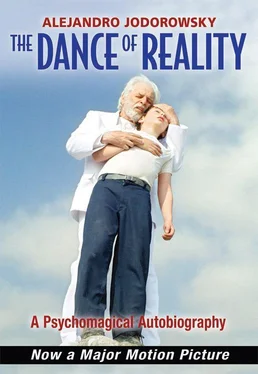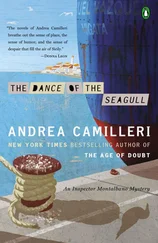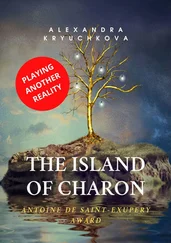I swore. I was ecstatic. If I disappeared, I would finally find out what existed beyond this gloomy reality. He had me go inside the armoire, lifted his red satin cape to hide me for a second, then let it drop. I had disappeared! Again, he lifted and dropped his cape. I reappeared! There was great applause. I returned to my seat. When my parents, my grandfather, and several other spectators asked me what the trick was, I answered with great dignity, “I have sworn to keep the secret forever, and so I shall keep it.” And I guarded the secret zealously until today, more than sixty years later, when I have decided to reveal it. I did not step into another dimension; while I was hidden in the cape a pair of gloved hands spun me around and shoved me into a corner. There was a person dressed all in black inside that black compartment who could not be seen. All he needed to do was cover me with his body in order for me to disappear. What profound deception! The great beyond did not exist. The miracles were mere illusions. And yet, I learned something more important: a secret, even one of little substance, when kept, gives one power. At school I declared that I had gone to another world, that I knew how to go there, that I had the ability to disappear whenever I wanted to. I also hinted that I had the power to make anyone I wanted disappear without returning. This did not gain me any new friends, but it diminished the teasing. I was given the silent treatment; no one spoke to me anymore. I had transitioned from receiving insults to receiving silence. The former had been less painful.
The boat let forth a hoarse sigh and pulled out of the port. The heart of my childhood remained in Tocopilla. The Rebbe, old Alejandro, and my happiness all left me straight away. I headed straight for a dark corner. I disappeared.
Do names seal destinies? Do certain places attract people whose emotional state corresponds to the hidden meaning of their names? Did the plaza of Diego de Almagro, where we came to live in Santiago de Chile, become a terrible place because of its namesake, who was a Spanish conquistador? Or was the place neutral and I felt dark, sad, and abandoned there because I made it the mirror of my sorrow? In Tocopilla I was grateful to my nose, despite my dislike of its curved shape, for bringing me the smell of the Pacific Ocean — an ample fragrance that arose from the icy waters mixed with the subtle perfume of the air of a perpetually blue sky. There, the sight of a cloud was an extraordinary event. The white clouds made me think of caravels transporting colonizing angels to enchanted forests where giant sugar trees grew. Beneath a sallow sky the air of Santiago smelled of electric cables, gasoline, fried food, and cancerous breath. The heady sound of the waves was replaced by the grinding of aging trains, piercing car horns, roaring engines, harsh voices. Diego de Almagro was a frustrated conquistador; following the deceitful advice of his comrade Pizarro he left Cuzco for unexplored lands to the south expecting to find temples with fabulous treasure. Greedy for gold he pushed on for four thousand kilometers, burning the huts of natives who were interested in fighting, not in building pyramids. Finally, he arrived at the desolate Strait of Magellan. The extreme cold and the ferocity of the Mapuche people decimated his troops. He returned in disgrace to Cuzco, where his treacherous comrade Pizarro, not wishing to share the riches stolen from the Incas, had him executed.
Jaime rented two rooms in a bedsit facing the unhappy plaza. It was a gloomy apartment divided up into bedrooms that were like cages. In a somberly furnished dining room we were served the same thing for lunch and dinner: anemic leaves of lettuce, a soup suggestive of chicken, a puree of sandy potatoes, a thin sheet of rubber referred to as steak, and for dessert a crippled biscuit covered with paste. In the morning there was coffee without milk and one piece of bread for each of us. Sheets and towels were changed once every fifteen days. And yet, neither my mother nor my father complained. Not my father because, detaching himself from family concerns, he was devoting himself to finding the right location where he could return to his own form of combat — the name of his new shop was El Combate, and he decorated it with a sign depicting two bulldogs pulling at the leg of a pair of women’s drawers, one on each side, indicating that the article in question was indestructible — and not my mother because Jashe, her beloved mother, lived just a few meters off the Almagro plaza. Hoping to enroll me in the public school, they left me a prisoner in these inhospitable surroundings in the charge of the landlady, a widow as dry as the daily potato purée, who would walk into my room without knocking with the sole aim of sharing her rants about the government of the People’s Front with me. While Jaime ate empanadas in the street and Sara sat around drinking maté in her mother’s house, I was laboriously swallowing the menu of the Eden of Croesus rooming house. Timid as I was, I hid my face behind the pages of the adventures of John Carter of Mars. Across from me sat an old woman, her back bent double, who had lost all her teeth except one canine on her lower jaw. Every time soup was served she would dig in her shabby handbag, furtively bring out an egg, break it against her single tooth with a trembling hand, and drop it into the insipid liquid, splattering the tablecloth and my book. I pictured her squatting in her room like an enormous plucked chicken, laying an egg each day in lieu of defecating. At the same time that I learned to conquer sadness, I had to learn to master disgust. At the end of each lunch and dinner she would bid me goodbye, kissing me on both cheeks. I forced a smile to my lips.
Finally, school started. I got up at six in the morning and carefully put my notebooks, pencils, and textbooks in order. Trembling from both the cold and my nerves, I walked out into the square with an empty stomach and sat down on a bench to wait until the time came to go to a place with children my age who did not know that I had been called Pinocchio, did not know that I had a mushroom, and did not know that my overalls covered milky-white legs.
Suddenly, sirens rang out and lights flashed. A police car appeared, followed by an ambulance. The empty plaza filled with curious people. The policemen dragged a dead beggar toward my bench as if I were an invisible child. Wild dogs had torn out his throat and devoured part of one leg, his arms, and his anus. Judging by the empty bottle of pisco that they found next to him he had passed out drunk, not reckoning with canine hunger. When I vomited the nurses, policemen, and gawkers appeared to see me for the first time. They began to laugh. One brute wiggled a stump on the cadaver, and looking at me asked, “Want a bite to eat, kid?” The taunts echoed in the air, and the air burned my lungs. I arrived at school with no hope left: the world was cruel. I had two alternatives: become a killer of dreams like everyone else or shut myself up in the fortress of my own mind. I chose the latter.
Mildewy rays of sun brought an intolerable heat. Without giving us time to put down our heavy book bags, the teacher loaded us all onto a bus that departed from the school. “Tomorrow classes start, today we’re going on a field trip to get some fresh air!”
There was applause and shouts of joy. All the children knew each other already. I sat in a corner on the back seat and kept my nose glued to the window. The roads of the capital city looked hostile to me. We drove along dark streets. I lost my sense of time. Suddenly, I realized that the bus was driving along a dirt road, leaving a cloud of red dust in its wake. My heart beat faster. There were patches of green everywhere! I was used to the opaque sienna of the barren mountains in the north. This was the first time I had seen plantations, trees lining the roads for miles at a stretch, and best of all, an intense chorus of insects and birds. When we arrived at our destination and left the bus, my schoolmates threw off their clothes with a clamor of joy and jumped nude into a crystal clear stream.
Читать дальше












